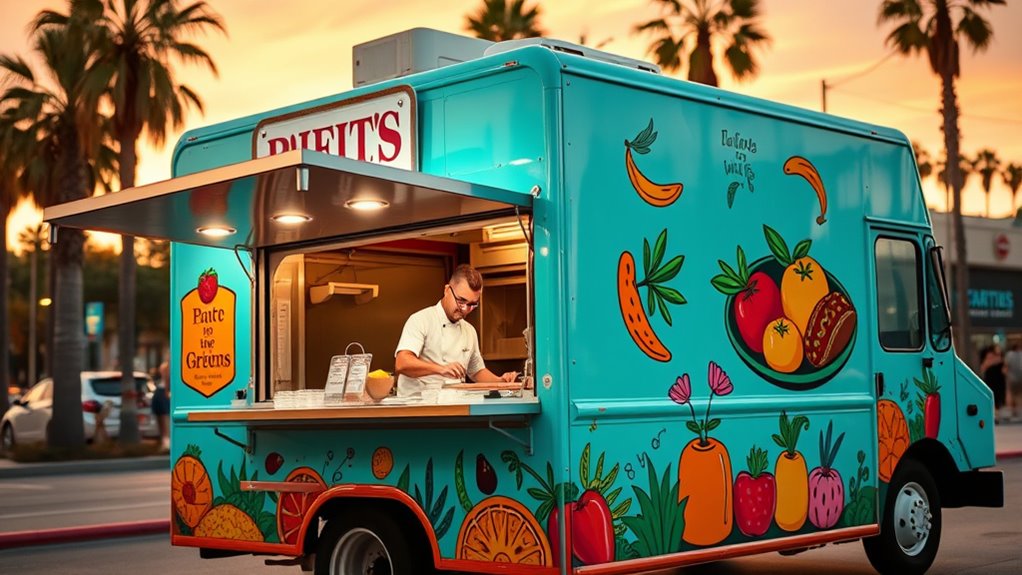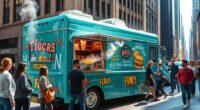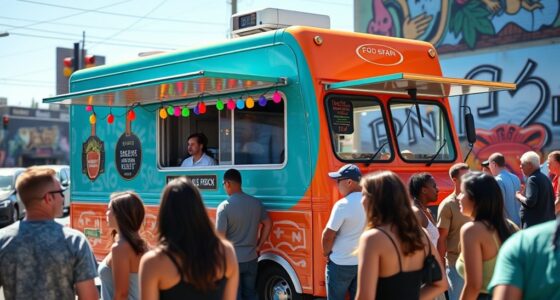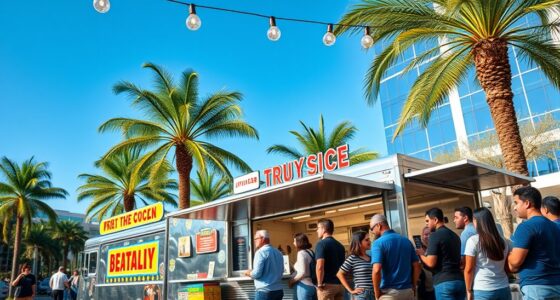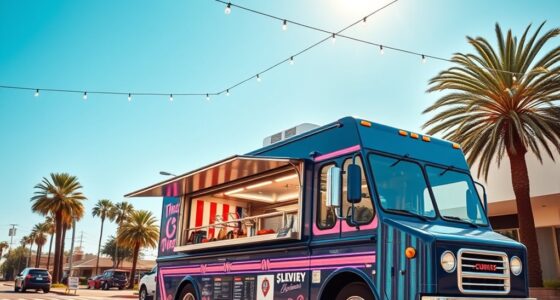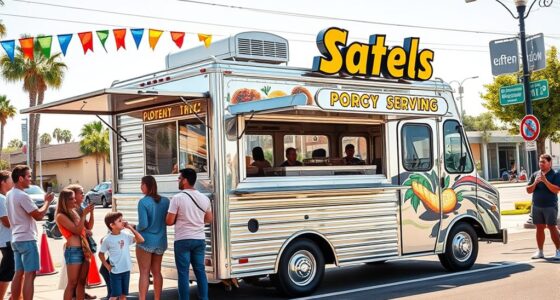To start a food truck in Los Angeles, you need to plan your routes around busy areas and events, obtain all necessary permits and insurance, and guarantee food safety standards are met. Budget for truck costs, equipment, licenses, and ongoing expenses. Develop a standout menu, utilize technology for smooth operations, and promote heavily on social media. If you want to build a successful LA food truck, there’s more to learn to make your venture thrive.
Key Takeaways
- Obtain necessary permits, licenses, and health inspections through online portals and ensure compliance with LA street zoning and sanitation standards.
- Develop a unique menu using local ingredients, set competitive pricing, and incorporate technology like contactless payments for efficiency.
- Secure a suitable vehicle within budget, explore grants, and acquire liability insurance to cover legal and operational risks.
- Plan strategic high-traffic locations and events, regularly updating based on foot traffic patterns and partnering with local organizers.
- Build a memorable brand, utilize social media marketing, engage customers, and participate in community events to stand out from competitors.
Starting a Food Truck Business

Starting a food truck business can be an exciting way to turn your culinary passion into a profitable venture. To succeed, focus on strong food truck branding that clearly communicates your unique identity and attracts customers. Your branding should be eye-catching and consistent across all platforms. Equally important is route planning—you need to identify high-traffic areas and events where your food will stand out. Research busy neighborhoods, festivals, and markets to maximize your exposure. Consistent route planning helps you build a loyal customer base and ensures steady sales. Remember, good branding and strategic route planning go hand-in-hand, setting the foundation for your food truck’s visibility and profitability from day one. Additionally, understanding food safety protocols, especially when handling raw ingredients like chicken, can prevent health issues and build trust with your customers.
Understanding Local Requirements
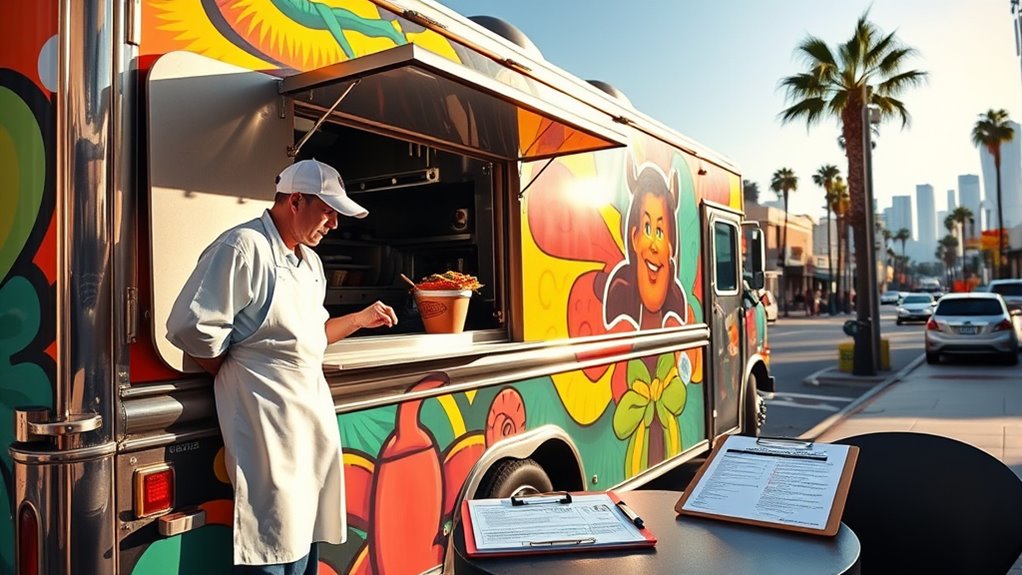
To get your food truck up and running in Los Angeles, you need to understand the local requirements. You’ll use the online permit application portal, meet sanitation standards, and keep detailed records. Additionally, you must park only in designated street zones to stay compliant with city regulations. Remember to incorporate food safety practices into your operations to ensure compliance with health standards and protect your customers.
Online Permit Application Portal
The Los Angeles online permit application portal streamlines the process of obtaining the necessary approvals for your food truck. With this digital licensing system, you can submit your online permit application conveniently from anywhere. The portal guides you through each step, guaranteeing you meet all local requirements efficiently. Instead of visiting multiple offices, you upload documents and complete forms digitally, saving time and reducing errors. You’ll receive updates on your application status directly through the portal, making it easy to track progress. This streamlined approach helps you avoid delays and get your food truck on the road faster. Familiarizing yourself with the online permit system ensures you understand the digital licensing process, making your startup journey smoother and more manageable.
Sanitation Standards and Recordkeeping
Understanding the sanitation standards and recordkeeping requirements in Los Angeles is essential for running a compliant and successful food truck. You must prepare for regular health inspections, which evaluate cleanliness, food storage, and proper sanitation practices. Proper sanitation training guarantees you and your staff follow protocols to prevent contamination and maintain hygiene standards. Keep detailed records of cleaning schedules, temperature logs, and employee sanitation training certifications. These records demonstrate your commitment to health standards and help streamline inspections. Failing to meet sanitation requirements can lead to fines or truck shutdowns. Staying proactive with sanitation training and meticulous recordkeeping safeguards your business, ensures compliance, and promotes customer trust. Regularly review local regulations to stay current with any updates or changes.
Designated Street Parking Zones
Securing the right parking spots is a vital step in operating your food truck smoothly in Los Angeles. You must understand local regulations around designated street parking zones to avoid fines or penalties. Los Angeles enforces parking rules through parking enforcement officers who monitor street signage closely, ensuring compliance. To navigate these rules effectively, consider these steps:
- Identify designated street parking zones where food trucks are permitted.
- Pay attention to street signage indicating parking hours, restrictions, and special permits.
- Obtain necessary permits and verify if parking enforcement requires specific documentation or fees.
Setting Up Your Base of Operations

Setting up your base of operations means choosing a shared kitchen that fits your needs and budget, so you should compare licensing requirements and fees carefully. Selecting the right custom kitchen equipment is vital to guarantee smooth daily operations and compliance with health regulations. By making informed decisions now, you’ll set a strong foundation for your food truck business to succeed. Additionally, understanding financial management strategies, such as budgeting and cost-cutting, can help ensure long-term profitability and operational stability.
Shared Kitchen Licensing and Fees
Establishing your food truck’s base of operations often involves utilizing shared kitchens, which can be a cost-effective and flexible option. When working in a shared kitchen, you need to take into account licensing fees that ensure compliance with local health and safety regulations. These fees vary depending on the facility and your specific needs.
To navigate this process smoothly, keep in mind:
- Review the licensing requirements for shared kitchens in Los Angeles.
- Budget for licensing fees, which typically range from a few hundred to over a thousand dollars annually.
- Confirm that the shared kitchen meets all health and safety standards required by local authorities.
Securing the right shared kitchen simplifies licensing and provides a reliable base for your food truck operations.
Custom Kitchen Equipment Selection
Choosing the right kitchen equipment is essential for creating an efficient and functional food truck. Selecting custom kitchen appliances tailored to your menu helps maximize space and performance. Focus on durable, easy-to-maintain equipment to reduce downtime and costs. Proper equipment maintenance ensures longevity and consistent operation. When choosing, consider these factors:
| Equipment Type | Key Feature | Maintenance Tips |
|---|---|---|
| Commercial Grill | Even heat distribution | Regular cleaning and calibration |
| Prep Tables | Space-saving design | Keep surfaces sanitized regularly |
| Refrigeration Units | Energy-efficient models | Check seals and defrost periodically |
| Cooking Appliances | Custom-fit for menu needs | Follow manufacturer maintenance guides |
| Storage Cabinets | Secure and organized | Keep organized, check for pests |
Optimizing your choices guarantees smooth operations and quality food delivery.
Budgeting and Financing Your Food Truck
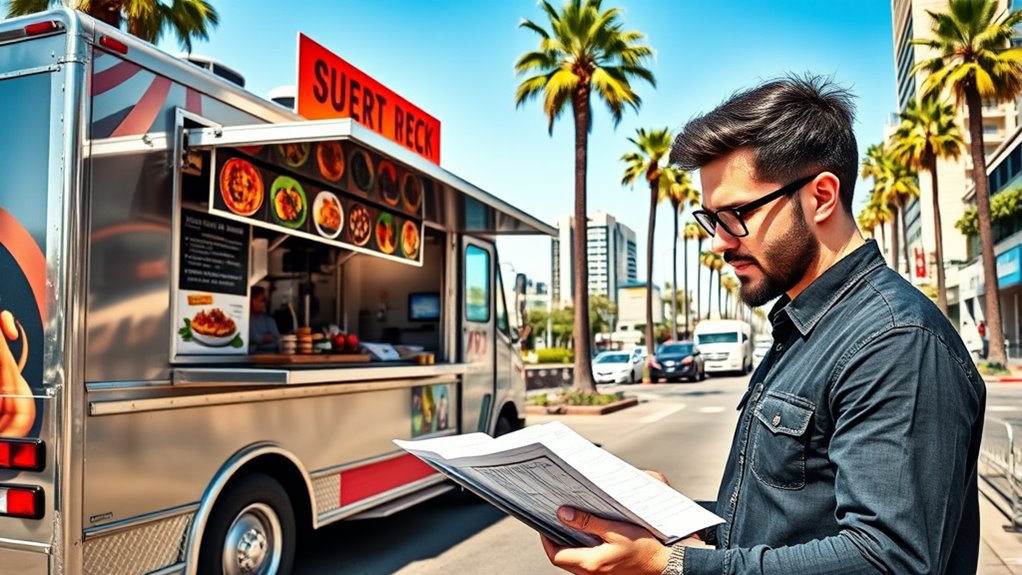
To get your food truck rolling, you’ll need to plan for the upfront costs of purchasing your vehicle. Explore local government small business grants that can help ease your financial burden, and make sure you understand liability insurance requirements to protect your investment. Budgeting carefully now sets the foundation for a successful food truck venture in Los Angeles. Additionally, developing a comprehensive financial plan and understanding your funding options can help you secure the necessary capital to launch and sustain your business.
Initial Vehicle Purchase Costs
Purchasing a food truck is a significant investment, and understanding the initial costs is essential for effective budgeting. The upfront expense varies depending on whether you buy new or used. Typically, you’ll pay:
- For a new truck, around $100,000 to $175,000, including customizations.
- For a used truck, between $20,000 and $80,000, but factor in potential repairs.
- Additional costs like vehicle maintenance and insurance, which are ongoing expenses that can add $2,000 to $5,000 annually.
Local Government Small Business Grants
Securing funding is a vital step in launching your food truck, and local government small business grants can be a valuable resource. These grant opportunities often provide small business funding without the need for repayment, easing financial pressure as you start. In Los Angeles, various city and state programs support small businesses, including food trucks, by offering grants to help cover startup costs or expand operations. To find these grants, research local agencies such as the Los Angeles Economic and Workforce Development Department or California’s Small Business Development Center. Keep in mind that grant applications typically require detailed proposals, proof of business plans, and financial statements. Applying for small business funding through grants can substantially boost your startup budget and reduce initial financial burdens.
Liability Insurance Requirements
Liability insurance is a crucial consideration when budgeting and financing your food truck, as it helps protect your business from potential legal claims and financial losses. Adequate liability coverage ensures you’re protected if customers or third parties sustain injuries or experience property damage. To effectively manage this, consider these key points:
- Determine the minimum liability coverage required by Los Angeles regulations.
- Choose a policy that covers common insurance claims in the food truck industry.
- Regularly review and update your coverage to match your business growth.
Having extensive liability insurance minimizes your risk of significant out-of-pocket expenses and ensures you’re prepared for unforeseen incidents. Proper coverage not only safeguards your assets but also enhances your credibility with customers and partners.
Designing Your Menu and Pricing Strategy
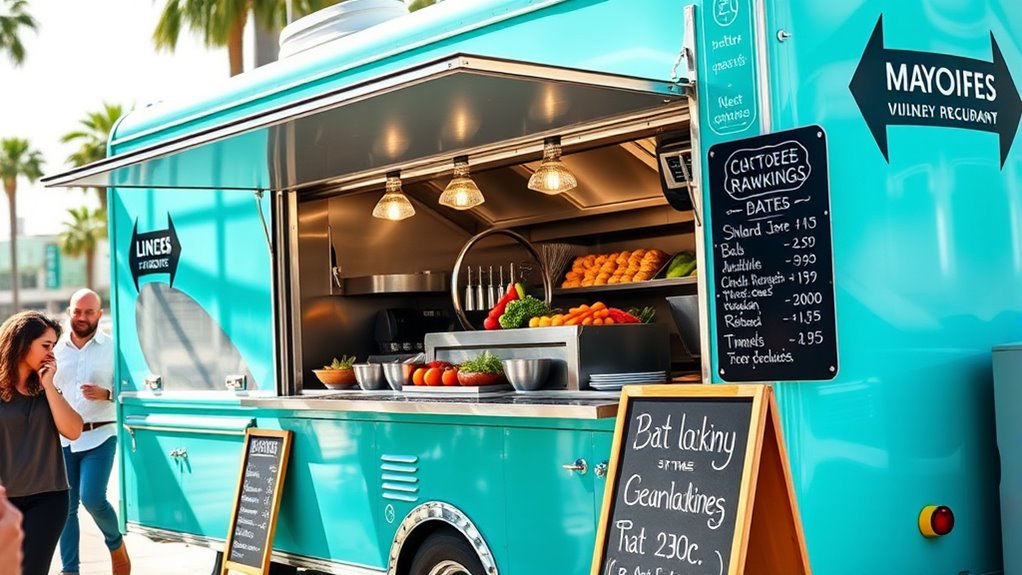
When designing your menu, consider sourcing innovative local ingredients to create unique dishes that stand out. Make sure your pricing covers costs and helps you reach your break-even point without losing customers. Balancing creativity with financial viability is key to a successful food truck operation.
Innovative Local Ingredient Sourcing
Have you considered how sourcing locally can transform your menu and pricing strategy? Using locally sourced ingredients not only enhances freshness but also creates a unique ingredient spotlight for your dishes. This approach allows you to:
- Highlight seasonal produce, making your menu dynamic and appealing.
- Build relationships with local farmers, often reducing costs and ensuring ingredient quality.
- Justify premium pricing by emphasizing the freshness and community support behind each dish.
Calculating Break-Even Point
Understanding how to calculate your break-even point is vital for designing a profitable menu and pricing strategy. By conducting a thorough profit analysis, you identify fixed and variable costs, helping you determine how much you need to sell to cover expenses. Sales forecasting plays a key role in this process, allowing you to estimate realistic sales volumes based on location, target customers, and menu choices. Once you know your break-even point, you can set prices that guarantee profitability while remaining competitive. Adjusting menu items and portion sizes based on this analysis helps maximize profit margins. Regularly reviewing your profit analysis and sales forecasts ensures your pricing strategy adapts to market changes, keeping your food truck financially sustainable in Los Angeles.
Technology and Operations

You can streamline your operations by offering contactless payment options, making transactions faster and safer for customers. Using a mobile POS system helps you manage sales and inventory on the go, saving you time and reducing errors. Embracing these technologies keeps your food truck efficient and ready to meet modern customer expectations. Additionally, implementing AI-driven solutions can further optimize order processing and inventory management, keeping your business competitive in a dynamic market.
Contactless Payment Options Available
Many food trucks in Los Angeles now offer contactless payment options to streamline transactions and enhance customer safety. By accepting contactless payment, you can reduce wait times and minimize contact. Using digital wallets like Apple Pay or Google Pay, your customers can pay quickly and securely. To implement this, consider these key steps:
- Choose a reliable payment processor compatible with digital wallets.
- Equip your truck with a contactless-enabled card reader.
- Promote your contactless payment options through signage and social media.
Offering contactless payment not only improves customer experience but also builds trust. It’s a simple upgrade that can boost sales and keep your operation modern and safe.
Mobile POS and Stock Tracking
Implementing mobile point-of-sale (POS) systems and stock tracking tools can substantially streamline your food truck’s operations. With a mobile POS, you replace the traditional cash register, making transactions faster and more flexible, especially on the go. These systems automatically record sales, reducing errors and simplifying accounting. For inventory management, stock tracking tools help you monitor ingredients and supplies in real-time, preventing shortages or overstocking. You can easily update inventory levels after each sale, giving you a clear picture of what’s available. This integration ensures smoother order processing, faster service, and better control over your stock. Overall, adopting mobile POS and inventory management tools enhances efficiency, minimizes manual work, and keeps your food truck running seamlessly during busy hours.
Marketing and Growing Your Presence
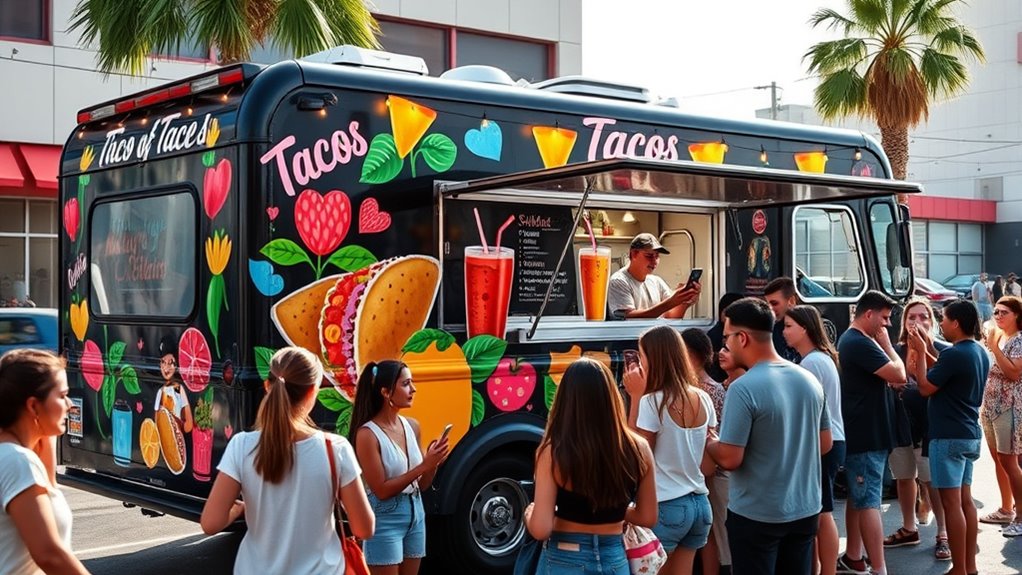
To grow your food truck’s presence, you should target popular lunchtime event spots where lots of potential customers gather. Using Instagram contests and creating catchy hashtags can also boost your visibility and engagement online. These strategies help you attract more followers and turn them into loyal customers.
Popular Lunchtime Event Spots
If you want to successfully grow your food truck’s presence in Los Angeles, focusing on popular lunchtime event spots is essential. These spots boost your food truck branding and enhance customer engagement. To maximize your impact, consider these key locations:
- Downtown LA’s Skid Row and surrounding business districts for high foot traffic.
- LA Live and Staples Center during event days draw large crowds.
- Santa Monica’s Pier and Venice Beach areas attract diverse lunch crowds.
Instagram Contests and Hashtags
Ever wondered how to boost your food truck’s visibility on Instagram? Using a smart hashtags strategy and engaging contest ideas can skyrocket your reach. Encourage followers to post photos with a custom hashtag, like #LAFoodTruckFest. To make it easier, try these contest ideas: best food photo, creative meal caption, or tagging friends for a chance to win free treats. Incorporate relevant hashtags to target local audiences, such as #LosAngelesEats or #LAFoodie. Here’s a quick look at effective hashtags strategies:
| Hashtag Type | Examples | Purpose |
|---|---|---|
| Local | #LAfoodtruck, #LAeats | Reach Los Angeles residents |
| Engagement | #Foodie, #FoodLover | Boost interaction |
| Campaign | #FoodTruckLA, #LAfood | Promote specific events or contests |
Mastering LA Food Truck Scene
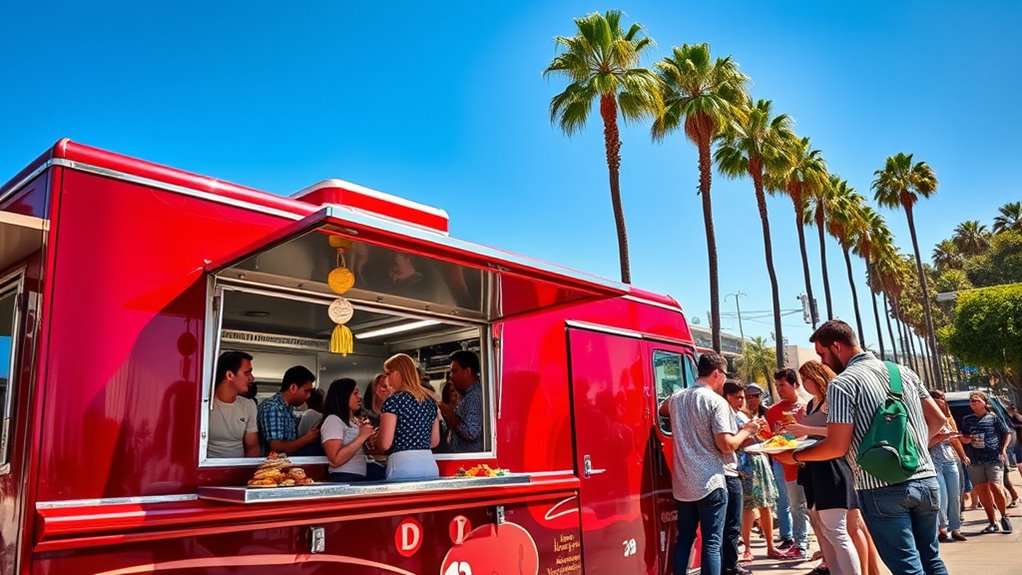
Charting the LA food truck scene requires more than just good food; it demands strategic planning and an understanding of local hotspots. To master this environment, focus on elevating your food truck branding to stand out amid fierce competition. Engage customers actively through social media, live events, and unique menu offerings. Consider these key steps:
- Identify high-traffic locations and events to maximize visibility.
- Build a consistent brand that resonates with LA’s diverse crowd.
- Use customer feedback to refine your offerings and increase engagement.
Frequently Asked Questions
What Are the Best Locations to Park My Food Truck in LA?
You should focus on LA hotspots like Santa Monica Pier, Venice Beach, and Downtown LA for prime food truck parking. These areas attract lots of foot traffic and tourists, boosting your sales. Also consider busy events, farmers markets, and office districts during lunch hours. Always check local regulations and parking permits to avoid fines. By targeting popular spots with high foot traffic, you’ll increase your chances of success and build a loyal customer base.
How Do I Find Reliable Staff for My Food Truck?
To find reliable staff for your food truck, focus on effective staff recruitment by posting on local job boards and social media. Conduct thorough interviews to assess skills and work ethic. Once hired, invest in employee training to guarantee your team understands your menu, customer service standards, and safety protocols. Building a strong, dependable team will help your food truck run smoothly and attract loyal customers.
What Permits Are Needed for Special Events and Festivals?
Did you know over 600 festivals take place annually in Los Angeles? For these events, you’ll need specific event permits and must adhere to festival regulations. Make sure to apply for a special event permit through the Los Angeles Department of Public Works and coordinate with the local health department for food service compliance. Securing the right permits guarantees your food truck operates smoothly and avoids costly penalties at festival sites.
How Can I Stand Out Among Other LA Food Trucks?
To stand out among LA food trucks, focus on strong branding strategies that reflect your unique identity. Develop a memorable logo, catchy name, and eye-catching truck design. Offer a unique menu that sets you apart—think fusion dishes or specialty items. Engage with your community on social media, share behind-the-scenes content, and provide exceptional customer service. These efforts help build loyal customers and distinguish your food truck in a competitive market.
What Insurance Coverage Is Recommended for Food Truck Operations?
You should get extensive insurance coverage, including general liability, vehicle insurance, and workers’ compensation if you have staff. Prioritize food safety and vehicle maintenance coverage to protect against accidents or health violations. This guarantees your truck stays compliant and minimizes risks. Regularly review your policy and keep detailed records to stay prepared for any unforeseen incidents, helping you operate smoothly and confidently on LA’s competitive food truck scene.
Conclusion
Now that you’ve navigated the nuances of launching your Los Angeles food truck, it’s time to take bold steps and build your brand. With savvy strategies, stellar service, and a sprinkle of creativity, you’ll stand out and succeed in this bustling food scene. Stay strategic, stay spirited, and savor every step of your startup journey. Remember, your passion and persistence will propel your food truck from a dream to a delicious destination on LA’s lively culinary landscape.
